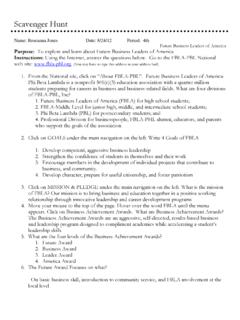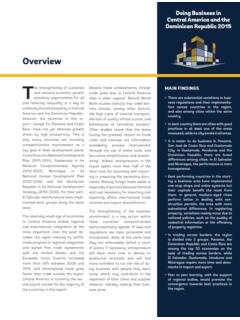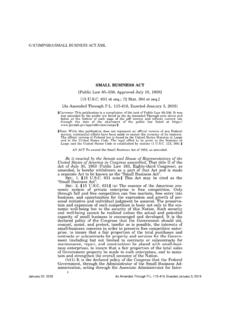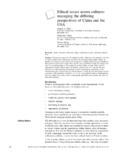Transcription of The Business of America is Lobbying
1 The Business Of America is Lobbying : Explaining the Growth of Corporate Political Activity in Washington, DC Lee Drutman, ABSTRACT: Why does corporate Lobbying in Washington, DC continue to expand, year after year? What are companies Lobbying for, and why? I argue that the modern growth of corporate Lobbying reflects a path-dependent learning process. Companies may come to Washington for many different reasons, but the act of establishing an office sets in motion several reinforcing processes that make companies value Lobbying more and more over time and that lead companies to become more proactive in their political strategies. The overall effect is that American businesses, once skeptical of government, cautious about getting involved in politics, and reactive in their strategies, have now become increasingly confident, proactive, and aggressive in their Lobbying efforts, and businesses are increasingly seeing government policy as not just a threat, but also as a tool.
2 As a result, corporate Lobbying activity is likely to continue to expand for the foreseeable future, with large corporations playing an increasingly central role in the formulation of national policies. My findings are based on original interviews with 60 corporate and trade association lobbyists and complete Lobbying histories of every company in the S&P 500 between1981 and 2005. 1 Over the last three decades, and particularly over the last ten years, there has been a significant expansion of private representation in Washington, DC. In 2009, politically active organizations reported $ billion on direct Lobbying expenses, up from $ billion reported just ten years prior,1 and, controlling for inflation, almost seven times the estimated $200 million in Lobbying expenses in Approximately 14,000 organizations are now listed in the Washington Representatives directory, double the approximately 7,000 listed organizations in 1981. 3 The number of pages in the Lobbying directory quadrupled between 1981 and 2008, going from 531 to 2,154.
3 Consistently, almost half of these organizations in Washington represent Business , and more than a third of them have consistently been individual corporations. Roughly 70 percent of the money is spent on behalf of groups representing Business . By the numbers, Business dominates the ranks of interests represented in (Schattschneider 1960; Schlozman and Tierney 1986; Baumgartner and Leech 2001). This paper is based on the premise that explaining the growth of Business Lobbying presents both a puzzle and an opportunity. It presents a puzzle because there is no immediately apparent explanation for the growth. When businesses expanded their political operations significantly in the 1970s, such growth made sense as a response to a significant expansion of new government regulations and social pressures (Vogel 1989). Such an explanation also fit well with established political science wisdom that groups 1 Controlling for inflation, this is an 87% increase.
4 These figures are based on publicly-disclosed Lobbying expenditures under the 1995 Lobby Disclosure Act. The actual amount of Lobbying expenditures is probably significantly greater. 2 Robert Reich, Supercapitalism (New York: Knopf, 2007), p. 134. 3 Figures on Washington Representatives listings come from Kay Lehman Schlozman et al. Who Sings in the Heavenly Chorus? The Shape of the Organized Interest System, paper presented at the annual Meeting of the American Political Science Association, Boston, MA, August 2008. 4 And yet, despite the seemingly predominant role that individual businesses and their associations play in the Washington, DC influence environment, Graham K. Wilson has estimated that there are about a hundred political scientists studying parties and elections for every one studying Business and politics. (2006, 33) And as David Hart remarked in the 2004 Annual Review of Political Science, If the Business of Washington is Business , the Business of American politics scholarship is anything but.
5 Individual companies are represented in American politics in large numbers. They are doing something, and we ought to learn what and why. This is not a new concern. Back in 1959, Robert Dahl exhorted: For all the talk and all the public curiosity about the relations between Business and politics, there is a remarkable dearth of studies on the subject. Similarly, in 1980, Edward Epstein echoed Dahl s bleak appraisal: Not only do we still await brave new theoretical frameworks and the dazzling empirical breakthroughs, Epstein wrote, but perhaps even more distressing, we still lack in a number of Business and politics areas a critical mass scholarship which offers the promise of significant research contributions in the near the few items that appear are either brief journalistic accounts or scatological studies. ; The Seventh edition of Interest Group Politics, released in 2002, contains 17 essays, excluding the introduction and conclusion; only one deals specifically with Business participation in the political process.
6 Cigler, Allan J. and Burdett A. Loomis, 2006 Interest Group Politics (Sixth Edition) (CQ Press: Washington ); In the sixth (2002) three of sixteen essays deal with corporations; the fifth edition, released in 1998, deals with Business specifically in only one of 16 essays. So, in the last three editions, only 5 of 49 essays (about 10%) are focused on Business political activity. 2 mobilize politically when their interests are threatened politically (Truman 1951; Hansen 1985). But Business political activity did not abate when the threats ceased. By the early 1980s, with the Reagan revolution in full swing and cost-benefit analysis in place, policymaking in Washington was increasingly sympathetic to Business . Corporate Lobbying activity, however, did not abate. Rather, it grew slowly. And in the mid-1990s, with Republicans in Congress and the threat of new regulation all but gone, Lobbying began to grow faster, and has been expanding at increasing rates since. Controlling for inflation, between 1998 and 2008 Lobbying expenditures5 increased faster than various measures of government size and activity (Figure 1).
7 The federal budget is a little bigger (up 38 percent), there is a bit more legislation (43 percent more bills), and the annual number of pages in the Federal Register has increased slightly (18 percent more pages, though the number of final rules has been declining down 22 percent). But Lobbying expenditures have increased by 77 percent, and the growth appears to be accelerating. Figure 1. Lobbying Growth and Government Growth Understanding the growth presents an opportunity because an explanation has the potential to shed light on the relative power of Business . If Business political activity is growing because companies are responding to government threats, this suggests less influence than if companies are proactively pushing changes to the status quo (as I will 5 This is a measure of all reported Lobbying expenditures, for all groups. It is not possible at this point to break out Business Lobbying as a share of all expenditures for each year, but the assumption is that since Business Lobbying accounts for roughly two-thirds of expenditures, the overall growth of expenditures is a rough proxy for the growth of Business Lobbying during this period.)
8 3 argue that they are). The latter would mean that businesses are having some influence in defining the agenda, and as Schattschneider (1960) put it: He who determines what politics is about runs the country, because the definition of alternatives is the choice of conflicts, and the choice of conflicts allocates power. (68; See also Bachrach and Baratz 1962.) This paper argues that the growth of corporate Lobbying is the result of a path-dependent learning process. Companies may come to Washington to respond to threats, but the act of establishing an office sets in motion several reinforcing processes that make companies value Lobbying more and more over time. Lobbyists teach managers about the importance of being politically active and help to point out (and sometimes even create) new opportunities for Lobbying . Managers gain more comfort and confidence in their ability to influence outcomes, and start to see participation as more appropriate and more valuable. The overall effect is that American businesses, once skeptical of government and cautious about getting involved in politics, have become increasingly confident, proactive, and aggressive in their Lobbying efforts.
9 This paper will proceed as follows: First, I briefly describe the data, providing an overview of the growth that has occurred. Then, I turn to theories of the firm to develop hypotheses for the growth. I will contrast the neoclassical approach, which views the firm as a unitary, omniscient actor capable of frictionless innovation, with three other theories, which direct more attention to the internal workings of the firm and its routines, experiences, ideologies, and information-processing techniques. In short, while the neoclassical view implies that changes in corporate political activity can be explained a predictable reaction to changes in the external environment, the other views conceive of political activity as an evolving process in which firms learn to see Lobbying as something valuable only once they start doing it, and then continue to expand their operations once they have committed to politics. To test the Lobbying -as-reaction hypothesis, I examine the relationship of the political agenda to industry Lobbying efforts in four case-study industries that have demonstrated significant growth.
10 I show that Lobbying in these industries is sometimes tied to a significant policy fight, but that company Lobbying levels either continue to rise or remain stable even after the policy fight has been resolved. I also show that many of the big legislative battles are attempts by industry to alter the status quo, suggesting that corporate lobbyists are having a proactive role in shaping the agenda. To test the learning hypothesis, I examine the stickiness of corporate Lobbying operations and show that there is indeed substantial inertia in corporate political activity. Once involved in politics, companies tend to stay involved, and past Lobbying efforts very strongly predict current Lobbying efforts, even three years back. There is also qualitative evidence show that lobbyists do spend a good deal of time educating managers about the value of politics and that information flows matter, providing support that companies do learn to see Washington as valuable. 4 There are important implications to the story presented here.









